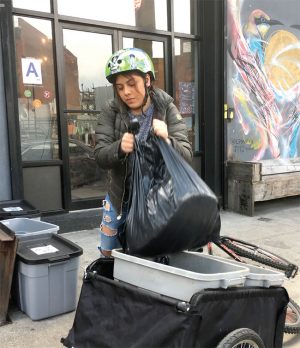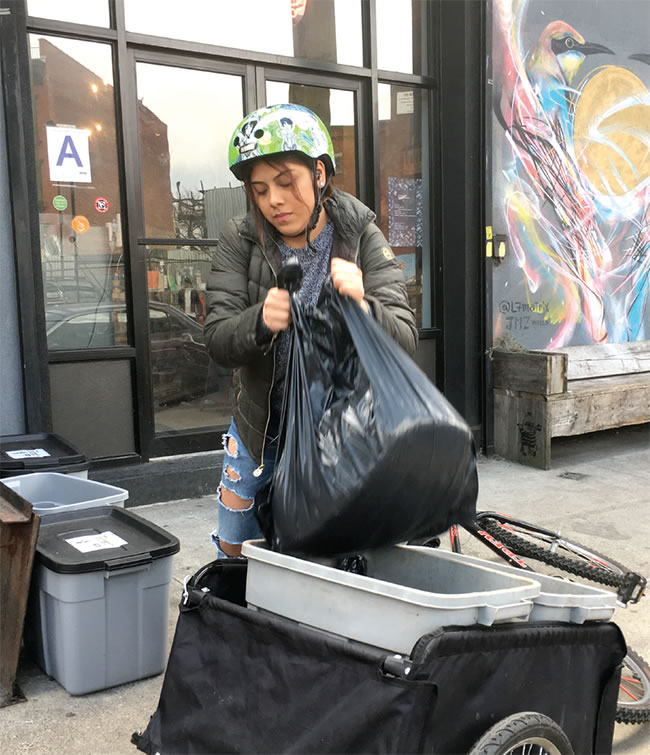BK ROT combines organics recycling with youth employment, environmental justice, and the creation of green space.
Guy Schaffer
BioCycle March/April 2017

This 3,600 sq. ft. “slice of paradise” in Brooklyn, located under the M train and flanked by busy streets, houses a food scraps composting operation (inset) and urban garden that provides employment to local youth. Photos courtesy of BK ROT
BK ROT is New York City’s (NYC) only bike-powered composting service that handles pick up, processing, and distribution. Over the last three years, BK ROT has developed into an important player in the community composting scene of NYC, creating a project that centers around youth of color, strengthening local economies, challenging environmental racism and gentrification, creation of green space — and organics recycling.

Four bike riders collect about 860 lbs/week of food scraps. BK ROT is part of a NYC Business Integrity Commission pilot that allows qualifying community composters to collect and transport organics from commercial establishments. Photos courtesy of BK ROT
KWL was created when Nurse and Peperone realized the project was going to need a permanent home, a site separate from the old garden. BK ROT began operating out of KWL in 2015 and moved all its operations there in 2016. The space is owned by the NYC Parks Department and licensed to BK ROT for free as part of the department’s Green Thumb program. A team of volunteers worked to turn the space into what it is today. While there was a structure on the site previously, it had been owned by the city and unused for 36 years.
Good Green Jobs
Youth involvement and employment is core to BK ROT. “There’s a lot of work in ecological stewardship that should be happening in the community,” explains Nurse. “It takes a lot of labor that’s not valued. This project puts value on that work and creates opportunities for the people who don’t populate mainstream environmental gigs. And in this case it’s black, Latino, and immigrant youth, and especially young women of color. It’s not that environmentalism isn’t rooted in these communities, it’s that they aren’t the people who typically benefit from ecosolutions through jobs.”
Statistics show that composting is good for labor. The Institute for Local Self-Reliance calculates that a composting facility creates 21.4 jobs for every $10 million invested in it, while a landfill only creates 8.4 jobs for the same investment. Nurse and Peperone are taking the job creation potential of composting and making sure it benefits youth and young adults of color. The project isn’t just ensuring that green jobs are distributed equitably, it’s also designing compost jobs around the principles of good work — safe, rewarding jobs where employees are treated with respect.
The system at KWL is designed to facilitate hands-on interaction with the whole workflow. It includes seven bins, three windrows, two tumblers and a worm bin. Workers move materials through two three-bin systems, then finish them in the windrows, before sifting finished compost into a holding bin for sale or donation. The tumblers let workers experiment with new techniques for improving the system — for instance, using bokashi to speed up the decomposition of compostable BioBags.
BK ROT’s operation is modest: four bikers haul a total of about 860 lbs/week of scraps. In 2016, the average was 365 lbs/week from commercial clients (two cafes) and 495 lbs/week from residential (including drop-off at a food coop). BK ROT is a nonprofit and while helped out by grants, there is no consistent funding stream other than membership and compost sales. When composting at the kind of scale that BK ROT does, each worker gets to understand the whole system — from the pick up schedule down to the microbial activity in the bins. They are trained to be compost experts, and demonstrate their scientific knowledge to visitors. All workers participate in decisions about the design of the project. The small scale makes the system more manageable. It’s easy for a few workers to maintain the composting operation with a minimum of odors and pests, which makes BK ROT better both for workers and neighbors.
Putting Compost On Display
After the first open house at KWL in the fall of 2015, the Brooklyn Paper called the site “the prettiest dump in town.” The paper isn’t wrong: the compost is surrounded by wildflowers and native grasses that grow abundantly (helped out, of course, by BK ROT compost). The composting system itself is handsome: the bins are made out of pink pine and corrugated metal, the windrows are neatly covered with rich brown overs, and the whole system sits on a solid concrete pad.
In the spring, summer, and fall, people wander in off the street to sit under the tree and sip beverages. Gardeners and workers chat with people waiting at the bus stop just outside the gate, and invite them in. KWL isn’t inviting despite being a waste management facility, it’s inviting because it’s a waste management facility.
KWL makes compost (and the work that goes with it) into something people want to spend time with. This is particularly important in Bushwick, where waste infrastructure has been a historical nuisance and burden for local residents. (North Brooklyn, despite housing 4% of the city’s population, houses 40% of its transfer facilities.) Creating a different type of waste system for Bushwick — one that makes space more livable, rather than less livable — offers a new vision of living with waste for New Yorkers.
Building Local Resource Cycles
In 2016, the Business Integrity Commission (BIC) of NYC, which regulates commercial waste collection, implemented a pilot program to allow qualifying community composting organizations to collect and transport organic waste from commercial establishments. BK ROT was already collecting material from a local woodshop and a coffee roaster, but the BIC pilot allowed the project to expand these collections and to charge for food scraps pick up from four businesses: three cafes and a food co-op.
Commercial pick ups are more efficient than residential pickups, and they also allow BK ROT to partner with local businesses in closing a resource loop in Bushwick. This keeps resources local, and the value of that labor local, further strengthening the community.
This part of the BK ROT mission has been appealing to its customers. The owner of Little Skips, a cafe in Bushwick, says that its business “has always been about building community.” Partnering with a project that is focused on community was “a no brainer” for the cafe owner. “It’s great to be working with a company that’s aligned to our needs and our business model,” she says.
Growing BK ROT
Like many similar projects, BK ROT demonstrates the potential of community composting to distribute the value of waste locally and to employ people equitably. However, it also demonstrates the challenges of trying to make a community-oriented operation function commercially. Community composting is often caught between two competing regulatory frameworks — rules about waste management and rules about community gardening. Waste regulations assume that composting operations will be big, smelly, and bad for neighbors, and community gardening regulations assume that composting will be done on a small scale, using volunteer labor.
In reality, community composting operations are, for the most part, adequately contained so they are only a minimal nuisance to neighbors, if any. And while there are plenty of operations that can run on volunteer labor, many would have a much easier time if they were able to charge for their services and pay their employees. BK ROT has been lucky to find local regulators and partner organizations that understand the benefit for their communities, organizers and volunteers who are willing to put in the hours, and workers who are passionate about the project.
Guy Schaffer studies transitions in waste systems and teaches social science at New Jersey Institute of Technology. He sits on the advisory board of BK ROT.










